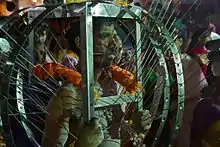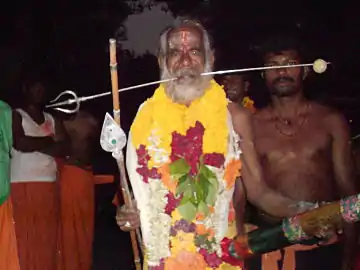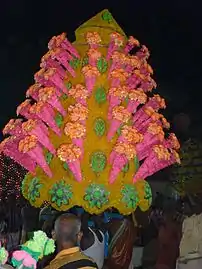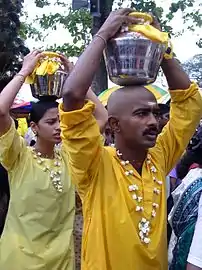Kavadi Aattam
Kavadi Aattam (Tamil:காவடி ஆட்டம், Malayalam: കാവടിയാട്ടം) ("Burden Dance") is a ceremonial sacrifice and offering practiced by devotees during the worship of Lord Murugan,[1] the Hindu God of War.[1] It is a central part of the festival of Thaipusam and emphasizes debt bondage. The kavadi ("burden") itself is a physical burden, the bearing of which is used by the devotee to implore Murugan for assistance, usually on behalf of a loved one who is in need of healing, or as a means of balancing a spiritual debt.[2] Devotees process and dance along a pilgrimage route while bearing these burdens.

| Part of a series on |
| Hinduism |
|---|
 |
|
| Part of the series on |
| Kaumaram |
|---|
 |
|
In Tamil Nadu, most of the Kavadis trek from Edappadi to Palani Hills.The Edappadi *sri PARUVATHARAJA KULA and Vanniya Kula Kshatriya's(Alachampalayam) community (ஸ்ரீ பருவதராஜகுல சமுதாயம் மற்றும் வன்னிய குல சத்திரியர்) kavadii is 361 year oldest kavadi in Tamil Nadu. The only one community have permission in staying one night Palani Murugan hills sannadhi it's a Pride of our PARUVATHARAJA KULA community.the Sincee then various Kavadi factions have emerged today
Origin
The kavadi aattam is steeped in mythology. At Mount Kailas, Lord Shiva entrusted the dwarf saint sage Agastya with two hillocks, the Shivagiri Hill and the Shaktigiri Hill, with instructions to carry and install them in South India. The sage left them in a forest and later asked his disciple, Idumban, to get them. Idumban found the two hillocks but could not initially lift them, until he obtained divine help. Near Palani in South India — where there is a famous shrine of Murugan — Idumban put the hillocks down to rest awhile. When he attempted to continue with his journey, he found that the hillocks were immovable.
Idumban sought the help of a scantily dressed youth, but the youth claimed the hillocks belonged to him. In the ensuing scuffle, Idumban was defeated. Idumban then realised that the youth was Lord Murugan. At this stage, Muruga had been outwitted in a contest for going round the world where his brother Ganapati had won the prized fruit. In anger, the frustrated child left the divine parents and came down to Tiru Avinankudi at the Adivaram (pronounced Adivâram and means foot of the Sivagiri Hill). Siva pacified Him by saying that He (Subrahmanya) Himself was the fruit (pazham) of all wisdom and knowledge. Later, Murugan withdrew to the hill and settled there as a recluse in peace and solitude.
Muruga had been made it impossible for Idumban to lift the hillocks. In the fierce battle that ensued, Idumban was killed but was later on restored to life. Idumban prayed that whoever carried on his shoulders the kavadi — signifying the two hills — and visited the temple on a vow should be blessed and that He (Idumban)should be given the privilege of standing sentinel at the entrance to the hill.
Hence the Idumban shrine is halfway up the hill where every pilgrim is expected to offer obeisance to Idumban before entering the temple of Dandâyudhapani. Since then, pilgrims to Palani bring their offerings on their shoulders in a kavadi aattam. The custom has spread from Palani to all Muruga shrines worldwide.
Preparation
The preparations start 48 days before the two-day Thaipusam festival. The devotees purge themselves of all mental and physical impurities. They take only one vegetarian meal per day and 24 hours before Thaipusam, they must maintain a complete fast.[2] The devotees prepare themselves by following strict purification austerities that include:[1]
- Transcendence of desire
- Shaving of the head
- Following a vegetarian diet and refraining from alcohol
- Sexual abstinence
- Bathing in cold water
- Sleeping on the floor
- Constant prayers
Bearing the kavadi
On the day of the festival, devotees undertake a pilgrimage along a set route while engaging in various acts of devotion, notably carrying various types of kavadi (burdens). At its simplest this may entail carrying a pot of milk (pal kavadi),[2] but piercing the skin, tongue or cheeks with vel skewers is also common.[2]
A more elaborate kavadi consists of two semicircular pieces of wood or steel which are bent and attached to a cross structure that can be balanced on the shoulders of the devotee. It is often decorated with flowers and peacock feathers (the vehicle of God Murugan) among other things. Some of the kavadi can weigh up to 30 kg.[2]
The most spectacular practice is the vel kavadi, essentially a portable altar up to two meters tall, decorated with peacock feathers and attached to the devotee through 108 vels pierced into the skin on the chest and back. Fire walking and flagellation may also be practiced. It is claimed that devotees are able to enter a trance, feel no pain, do not bleed from their wounds and have no scars left behind.
Thaipusam outside of India
Thaipusam is celebrated in many different countries outside of India mainly in Sri Lanka, Sri Siva Subramanya kovil Nadi Fiji Mauritius, Singapore, Malaysia, Reunion island and by their Diaspora in western countries such as UK, Germany, France, Italy, South Africa etc.
Picture gallery
See also
References
- Kent, Alexandra. Divinity and Diversity: A Hindu Revitalization Movement in Malaysia. University of Hawaii Press, 2005. (ISBN 8791114896)
- Hume, Lynne. Portals.



